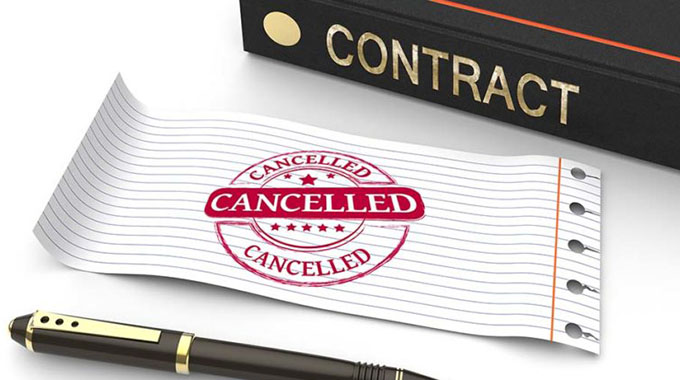Guarding against breach of contract

Godknows Hofisi
Contractual disputes involving natural or juristic persons are prevalent. Such disputes emanate from alleged breach of contracts and may be handled at different levels such as:
By the parties themselves, or
By the parties’ legal practitioners, usually through conciliation, mediation, arbitration or litigation.
Breach in a contract or agreement, in simple terms, refers to a situation where a party to such a commercial agreements breaks the terms set out in the contract. In other words a party does not honour its part of the agreement.
Safeguards against breach
It is advisable to take precautionary measures against possible future breach of contract. Breach, especially if it is material, that is not rectified or cured as provided for in the contract document can have far reaching implications such as termination or claims for damages.
Some of the safeguards parties can employ in a contract may include the following:
Documenting the agreement.
Providing for the worst case scenario.
Drafting of contracts.
Definition of key words.
Preamble.
Clarifying nature of agreement.
Rights and obligations / duties of parties.
Key deliverables and timeframes.
What constitutes breach.
How to rectify breach.
Consequence of breach.
Proactive communication
Documenting agreements
An undocumented agreement, just like unrecorded history, is susceptible to different interpretation. In the case of agreements this may lead to contractual disputes. Such disputes may arise from different understanding or even unilateral variation of the terms and conditions thereof. It is therefore a golden rule that parties should document and sign agreements especially right at the beginning when parties are likely to be genuine with each other, focus is still on making the commercial agreement work or parties still remember the finer details of what they seek to do.
It does not matter how well you know each other, how sincere one appears to the other, whether you go to church or drink together. Life is dynamic and things can change so fast. William Shakespeare in his book Macbeth wrote “There is no art to find the mind’s construction in the face”.
Provide for the worst case scenario
There is usually optimism flavoured with excitement during deal negotiation. Some of the optimism may be misplaced or unmeasured and can easily envelop the reality that the unintended can visit the commercial agreement. No matter how mouth- watering a deal may appear always provide for the worst case scenario and ask your legal practitioner to make the necessary provisions in the contract.
Drafting of contracts
I have seen contracts drafted by parties themselves to the exclusion of the legal profession. Some have been drafted by paralegal people. Parties may get away with this to the extent that there are no contractual disputes or the loss is low. Parties are advised to make use of expert legal practitioners who are qualified and experienced to address the business arrangement. Examples may include sale of properties, shares or mining claims. Other agreements may include joint ventures, mining tribute agreements or construction contracts.
Definition of key words
Key words used in the contract should be defined in the definition clause for clarity. Parties are encouraged to understand these key words before signing the agreement.
Preamble
A preamble is included at the beginning of an agreement to give context to the contract. This may cover issues such as background, what parties wish to do, etc. This is highly recommended for example to give clarity to the nature of the anticipated business arrangement.
Nature of agreement
This may appear simple until there is a problem. I have come across situations where signatures have been appended to documents that did not capture what parties intended to do. Such agreements may have been prepared by parties themselves or some paralegal people using the “copy and paste” practice of precedents. For example parties may not appreciate the different in a Non – Disclosure Agreement (“NDA”), Memorandum of Understanding (“MOU”) and actual contractual agreements such agreement of sale. Some parties do not even know whether they are exchanging shares, are in a joint venture or a loan arrangement. There can even be confusion over dividends, profit share or interest.
Rights and obligations of parties
It may happen that parties generally understand what they are expected to do. They may not appreciate how the rights and obligations were captured in the final agreement. Lawyers are advised to simplify agreements for parties. Clients can be walked through agreements to ensure they understand finer details of agreements before they sign. I have been moved at times when parties admit that they did not have full understanding before and are thankful for the clarity and emphasis brought to them.
Usually obligations, for example in an agreement of sale, include the purchaser’s duty to make payment by due date and the seller to deliver goods as provided for in the agreement.
Key deliverables and timeframes
Linked to rights and obligations are key deliverables and timeframes. Disputes are usually over violated timeframes. Parties are encouraged to negotiate realistic timeframes and to understand key time measurement such as days (whether business or calendar days), weeks or months. 7 business days are more than a week.
What constitutes breach
For clarity an agreement should clarify what constitutes breach. Some contracts even categorize breach into minor and serious and specify implications thereof. Serious breach may lead to termination or claim for damages and this can be devastating.
How to rectify breach
A party should know what the contract provides for in rectifying breach. This may be specific action required in a specified period.
Proactive communication
A party may proactively communicate to the other that performance is now due.
Conclusion
Breach is at the centre of most contractual disputes. Entrepreneurs, business executives and legal practitioners will make a huge difference by ensuring that transacting parties have adequate safeguards in contractual agreements to avoid breach. Parties should have the culture of reading before signing agreements.
Disclaimer
This simplified article is for general information purposes only and does not constitute the writer’s professional advice.
Godknows (GK) Hofisi, LLB(UNISA), B.Acc(UZ), CA(Z), MBA(EBS,UK) is a legal practitioner / conveyancer, chartered accountant, corporate rescue practitioner, registered tax accountant and consultant in deal structuring and is an experienced director of companies. He writes in his personal capacity. He can be contacted on +263 772 246 900 or [email protected]









Comments